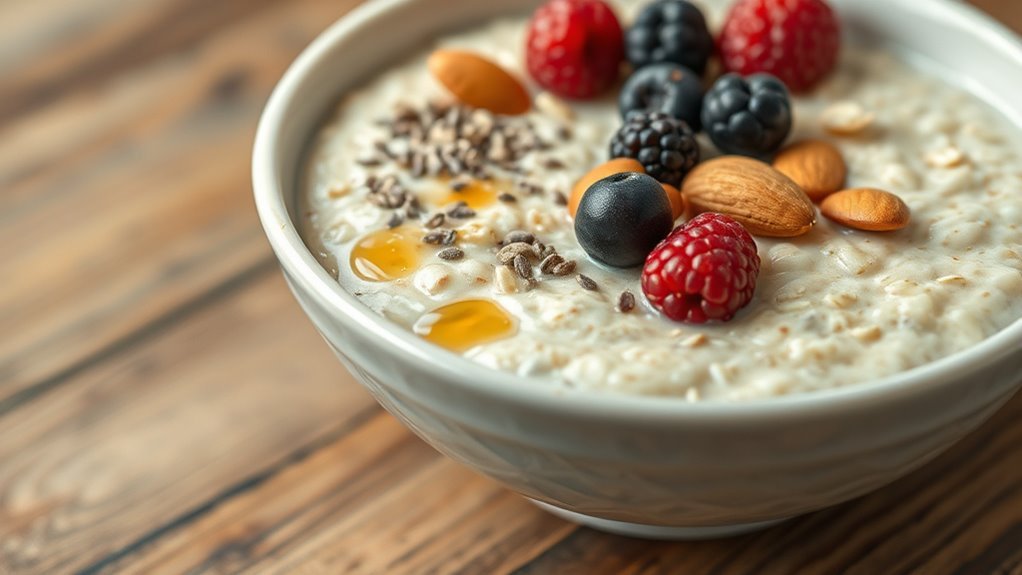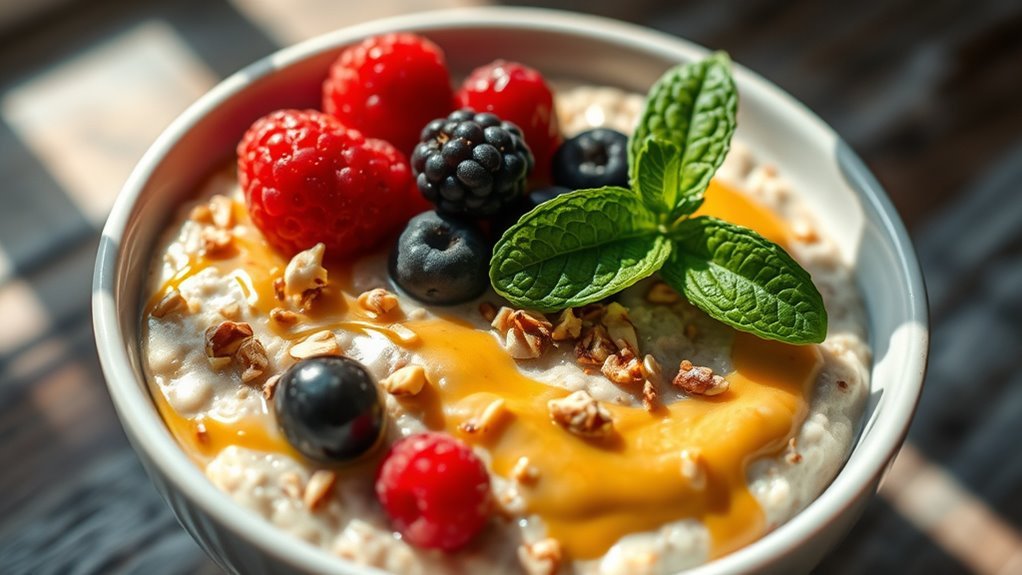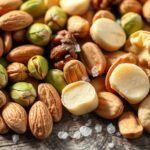Oatmeal isn’t typically considered keto-friendly because of its high carbohydrate content, which can interfere with maintaining ketosis. A standard serving has about 27 grams of carbs, making it challenging to fit within the keto diet’s daily limit of 20 to 50 grams. However, if you’re looking for alternatives that mimic oatmeal’s texture but are lower in carbs, you can explore options like chia seed pudding or flaxseed meal. There’s more to discover about smart substitutions and creative ideas for keto meals.
Understanding the Ketogenic Diet

The ketogenic diet, often referred to as keto, is a low-carbohydrate, high-fat eating plan designed to shift your body’s metabolism from relying on glucose to utilizing fat for energy. By embracing ketogenic principles, you reduce carbohydrate intake considerably, which prompts your body to enter a state called ketosis. In ketosis, your liver converts fat into ketones, providing an alternative energy source. This process encourages fat adaptation, allowing your body to efficiently burn fat instead of carbs. Many find that this shift not only aids in weight loss but also enhances mental clarity and energy levels. However, it’s essential to approach keto mindfully, balancing fats and ensuring nutrient adequacy while enjoying the freedom it offers in meal choices. Additionally, understanding ketosis as a metabolic state can help you navigate the challenges and benefits of the keto diet more effectively.
Nutritional Profile of Oatmeal

Oatmeal is often celebrated for its health benefits, but when it comes to the ketogenic diet, its nutritional profile warrants careful consideration. Different oatmeal varieties offer unique nutritional benefits, which can play a role in your diet choices.
| Oatmeal Variety | Fiber (g) | Protein (g) |
|---|---|---|
| Rolled Oats | 4 | 5 |
| Steel-Cut Oats | 5 | 6 |
| Instant Oats | 3 | 4 |
While oatmeal is packed with vitamins and minerals, you should assess how its nutritional profile aligns with your keto goals. The fiber can aid digestion, but understanding your overall carb intake is essential to maintain ketosis. Choose wisely based on your nutritional needs!
Carbohydrate Content in Oatmeal

When considering the carbohydrate content of oatmeal, it’s essential to understand how it fits into a ketogenic diet. Oatmeal is relatively high in carbs, with a standard serving containing about 27 grams of carbohydrates. For those following keto, this can greatly impact your daily carb limit, which is typically around 20 to 50 grams. If you’re seeking oatmeal substitutes, you might explore options like chia seeds or flaxseed meal, which are low carb grains. These alternatives provide similar textures and flavors without derailing your ketosis. It’s important to balance your meals and guarantee you’re meeting your nutritional needs while enjoying the freedom of choosing foods that align with your lifestyle. Always check labels and track your carbohydrate intake carefully.
Fiber and Its Role in a Keto Diet
Fiber plays an essential role in a keto diet, supporting digestive health while helping you feel full. While many high-fiber sources like fruits and whole grains are often restricted, there are still plenty of keto-friendly options available. Understanding the importance of fiber can help you maintain balance and overall well-being on your keto journey.
Importance of Dietary Fiber
While many people associate low-carb diets with limited food choices, the importance of dietary fiber shouldn’t be overlooked, especially in a keto diet. Fiber plays a vital role in maintaining digestive health and ensuring you feel full, which can help with weight management.
Here are some key fiber benefits to keep in mind:
- Supports digestion: Different fiber types, like soluble and insoluble, aid in regular bowel movements.
- Helps control blood sugar: A higher fiber intake can stabilize glucose levels after meals.
- Promotes satiety: Including fiber sources in your diet can help you feel satisfied, reducing cravings. Additionally, incorporating low-carb alternatives can help you enjoy fiber-rich foods while staying within your dietary limits.
Fiber Sources on Keto
Including adequate fiber sources in your keto diet can enhance its benefits while helping to maintain digestive health. While traditional grains are off the table, you’ve got plenty of low-carb options to choose from. Foods like chia seeds, flaxseeds, avocados, and leafy greens are excellent sources of fiber that fit seamlessly into a ketogenic lifestyle. These fiber sources not only support digestive health but also help you feel fuller longer, which can aid in weight management. Incorporating nuts and seeds can also add variety to your meals while providing healthy fats. By prioritizing these fiber-rich foods, you’re optimizing your keto diet and enjoying the freedom to explore diverse flavors without sacrificing your health goals. Additionally, incorporating low-carb leafy greens can further enhance nutrient intake on your keto journey.
Digestive Health Benefits
When you’re following a keto diet, maintaining digestive health can be a challenge due to the reduced intake of traditional carbohydrate sources. However, focusing on fiber and its benefits can help support your gut microbiome. Incorporating fiber-rich foods can enhance digestive health and offer prebiotic properties, which nourish beneficial gut bacteria.
Here are some key points to evaluate:
- Promotes Regularity: Fiber aids in regular bowel movements, preventing constipation.
- Supports Gut Health: Prebiotics foster a healthy gut microbiome, which is essential for overall health.
- Enhances Nutrient Absorption: A balanced fiber intake can improve the absorption of nutrients from your meals.
Types of Oatmeal: Which Is Best?
When choosing oatmeal on a keto diet, it’s important to compare the nutritional content of different types. Some options are lower in carbs and higher in fiber, making them more suitable for your dietary needs. Let’s explore which oatmeal varieties are best for maintaining ketosis while still enjoying this popular breakfast.
Nutritional Content Comparison
Oatmeal, a staple breakfast choice for many, varies considerably in nutritional content depending on the type you choose. Understanding these differences is essential, especially if you’re considering oatmeal substitutes for a keto diet. Here’s a quick comparison:
- Steel-Cut Oats: Higher in fiber and lower on the glycemic index, making them a slower-digesting option.
- Rolled Oats: More processed than steel-cut, they still offer decent nutrition but can spike blood sugar faster.
- Instant Oats: Often contain added sugars and preservatives, making them the least desirable option for keto snacks.
Each type has its pros and cons, so weigh your choices carefully to align with your dietary goals and lifestyle. Embrace variety while keeping your carb intake in check!
Best Low-Carb Options
Which low-carb options can you consider when it comes to oatmeal? If you’re seeking the best low carb grains for a keto-friendly breakfast, search no further than chia seeds, flaxseeds, and hemp hearts. These options are not only low in carbs but also packed with fiber and healthy fats, making them ideal for your morning meal. You might also explore coconut flour or almond flour, which can be used to create oatmeal-like dishes while keeping your carb count low. Additionally, consider incorporating unsweetened cocoa powder for a chocolatey twist. By choosing these alternatives, you can enjoy satisfying keto breakfast options that align with your dietary goals while still feeling free to indulge in delicious flavors. Chia seeds, for example, have a net carb count of just 2 grams per serving, making them an excellent addition to your low-carb meals.
Alternatives to Oatmeal for Keto
If you’re following a keto diet but find yourself missing the warm, hearty comfort of oatmeal, there are several alternatives that can satisfy your cravings while keeping your carb intake low. Consider these options:
- Chia Seed Pudding: Packed with fiber and healthy fats, chia seeds thicken when mixed with liquid, creating a creamy texture.
- Flaxseed Meal: This is a great base for low-carb porridge. Mix it with water and heat for a nutritious breakfast.
- Coconut Flour Porridge: Combine coconut flour with almond flour and water or nut milk for a tasty, filling alternative.
These alternatives not only offer flavor but also provide a range of nutrients, helping you stay on track with your keto lifestyle. Additionally, incorporating healthy fats into these recipes can further enhance your satiety and support your ketogenic goals. Enjoy your freedom to indulge!
How to Incorporate Oatmeal Into a Keto Diet
While traditional oatmeal is generally high in carbohydrates, it’s possible to enjoy it in moderation by carefully managing portion sizes and incorporating low-carb ingredients. Start by using a smaller serving of low-carb oatmeal options, like chia seeds or flaxseed meal, which can mimic the texture without the carbs. You can create delicious oatmeal recipes by adding unsweetened almond milk, nuts, or berries, keeping your net carbs in check. For keto meal prep, consider making overnight oats with these low-carb ingredients, ensuring you have a quick and satisfying breakfast ready. By balancing your oatmeal intake with plenty of healthy fats and proteins, you can enjoy a keto-friendly meal while still savoring the comforting essence of oatmeal. Additionally, monitoring your overall daily carb intake is essential to maintaining ketosis while enjoying a variety of foods.
Potential Health Benefits of Oatmeal
Oatmeal, even in its modified forms, can offer several health benefits worth considering. It’s packed with nutrients that support overall well-being and can be a valuable addition to your diet.
- Rich in Antioxidants: Oatmeal contains avenanthramides, which are antioxidants that may help reduce inflammation and lower blood pressure.
- Supports Heart Health: This whole grain is linked to improved heart health by helping to lower cholesterol levels and provide essential fiber.
- Promotes Satiety: Eating oatmeal can keep you feeling full longer, which may assist in weight management.
Incorporating oatmeal into your routine could provide these benefits while allowing you to enjoy a delicious, versatile meal option. Just be mindful of portion sizes to align with your dietary goals.
Final Thoughts on Oatmeal and Keto Compatibility
Considering the keto diet’s emphasis on low carbohydrate intake, it is essential to weigh the potential inclusion of oatmeal carefully. While oatmeal offers certain health benefits, its high carb content can pose challenges for those strictly adhering to keto guidelines. If you’re craving a warm breakfast, consider oatmeal alternatives like chia seed pudding or flaxseed meal. Additionally, remember that oat milk’s higher carbohydrate content may also influence your choices when looking for suitable breakfast options.
| Oatmeal Alternatives | Keto Friendly Toppings |
|---|---|
| Chia Seed Pudding | Almond Butter |
| Flaxseed Meal | Coconut Flakes |
| Cauliflower Oats | Berries (in moderation) |
| Riced Broccoli | Sugar-Free Syrup |
| Egg-Based Oatmeal | Cinnamon or Nutmeg |
Ultimately, staying informed about your choices can help you find delicious, low-carb options that fit your lifestyle.
Frequently Asked Questions
Can I Eat Oatmeal on a Strict Keto Diet?
You can’t eat oatmeal on a strict keto diet. Imagine starting your day with a warm bowl of oatmeal, but the reality is that it’s packed with carbs, pulling you away from your keto goals. Instead, consider oatmeal alternatives like chia seeds or flaxseeds, which offer low carb grains while keeping your meals satisfying. These options provide the freedom to enjoy breakfast without derailing your keto journey. Embrace the substitutes for a healthier you!
How Does Oatmeal Affect Ketosis Levels?
Oatmeal can greatly impact your ketosis levels due to its carb content. A typical serving contains around 27 grams of carbs, which might exceed your daily limit for maintaining ketosis. If you’re aiming for strict ketosis, consuming oatmeal could disrupt your progress. However, some people may still enjoy it in moderation, balancing their overall carb intake. It’s essential to evaluate your personal goals and how your body responds to carbohydrates.
Are There Keto-Friendly Toppings for Oatmeal?
You can’t have your cake and eat it too, but you can enjoy keto-friendly toppings for oatmeal! Consider using low carb toppings like unsweetened coconut flakes, chia seeds, or crushed nuts. These keto oatmeal alternatives not only enhance flavor but also keep your carb count low. A sprinkle of cinnamon or a few berries can add a touch of sweetness without derailing your diet. Enjoy your breakfast while staying true to your keto goals!
Is Instant Oatmeal Suitable for Keto?
Instant oatmeal isn’t typically suitable for a keto diet due to its higher carb content. When you look at instant oatmeal nutrition, you’ll notice it often has added sugars and lower fiber compared to traditional oats. If you’re craving oatmeal, consider keto oatmeal recipes that use alternatives like chia seeds or flaxseed meal. These options provide the texture you want while keeping your carb intake low, giving you the freedom to enjoy breakfast without compromising your goals.
What Are Common Oatmeal Substitutes for Keto?
Think of your breakfast bowl as a canvas; with the right oatmeal alternatives, you can paint a delicious low-carb masterpiece. Instead of traditional oatmeal, you might try chia seeds or flaxseeds, which are low-carb grains packed with fiber. Another great option is cauliflower rice, providing a grain-like texture without the carbs. These substitutes not only keep you aligned with your keto goals but also give you the freedom to enjoy varied flavors and textures.
Frequently Asked Questions about Oatmeal and the Keto Diet
1. Is oatmeal considered keto-friendly?
Oatmeal is generally not considered keto-friendly due to its high carbohydrate content. A typical serving of oatmeal contains around 27 grams of carbohydrates, which can exceed the daily carb limit for those following a strict ketogenic diet, typically set at 20-50 grams of carbs per day. For a food to be keto-friendly, it should be low in carbohydrates while providing healthy fats and adequate protein.
2. Are there any alternatives to oatmeal that are keto-friendly?
Yes, there are several keto-friendly alternatives to oatmeal. Some popular options include chia seed pudding, flaxseed meal, or coconut flour porridge. These alternatives are low in carbs and high in fiber and healthy fats, making them suitable for a ketogenic diet. You can also consider using almond flour or hemp hearts to create a low-carb breakfast option that mimics the texture of oatmeal.
3. Can I occasionally include oatmeal in a low-carb diet?
While it’s best to avoid oatmeal on a strict keto diet, some individuals on more flexible low-carb diets might choose to include it in moderation. If you do decide to have oatmeal, consider portion control and pair it with high-fat toppings like nuts, seeds, or coconut cream to balance the carb intake. Always monitor your overall daily carb consumption to ensure it aligns with your dietary goals.
4. What are the health benefits of oatmeal?
Oatmeal offers several health benefits, including being a good source of soluble fiber, which can help lower cholesterol levels and improve heart health. It also provides essential vitamins and minerals, such as manganese, phosphorus, magnesium, and iron. Additionally, oatmeal can help with digestion and promote a feeling of fullness, which can aid in weight management, although these benefits are more relevant for those not strictly adhering to a ketogenic diet.
5. How can I make oatmeal more keto-friendly?
To make oatmeal more keto-friendly, consider reducing the portion size and mixing it with low-carb ingredients. For example, you can prepare oatmeal using almond flour or a small amount of rolled oats combined with chia seeds or flaxseeds. Adding high-fat toppings such as butter, coconut oil, or full-fat yogurt can also enhance the fat content while helping to keep your carb intake lower. Remember to track your macros to ensure you stay within your limits.
References
- https://www.healthline.com/nutrition/oatmeal-keto-friendly
- https://www.verywellfit.com/oatmeal-and-keto-diet-5198476
- https://www.ncbi.nlm.nih.gov/pmc/articles/PMC7074383/
- https://www.webmd.com/diet/what-is-the-keto-diet
- https://www.diabetes.org/nutrition/healthy-foods/oats
- https://www.health.gov.au/resources/publications/healthy-eating-guide
- https://www.mayoclinic.org/healthy-lifestyle/nutrition-and-healthy-eating/in-depth/keto-diet/art-20459800


